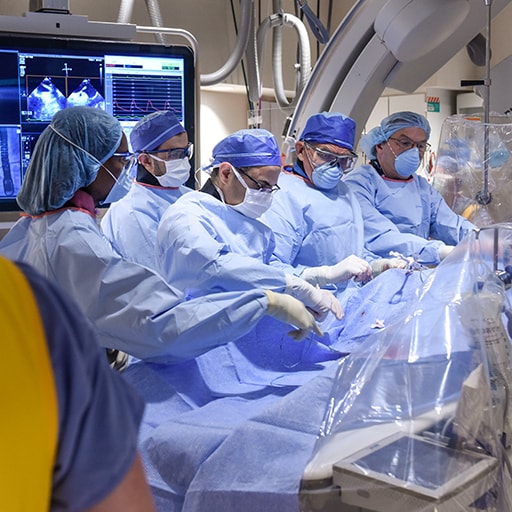Cardiology Jupiter’s expert tips for reducing cholesterol naturally
Wiki Article
Understanding the Significance of Cardiology in Modern Healthcare Providers
Cardiology plays a crucial function in contemporary health care, especially as heart condition remains to be the leading cause of death worldwide. Advancements in diagnostics and treatment have changed client treatment, allowing earlier treatments and boosted outcomes. Furthermore, the change in the direction of preventative cardiology encourages people to manage their health and wellness proactively. As technology remains to progress, the integration of ingenious solutions might better redefine cardiology's influence on public health, triggering a better examination of arising patterns and their effects.The Prevalence of Cardiovascular Disease and Its Influence On Public Health And Wellness
Heart condition remains the leading reason of death worldwide, its influence prolongs much beyond specific clients to influence public health systems and economic climates. The high occurrence of heart problem places a significant pressure on healthcare resources, requiring raised funding for prevention, treatment, and recovery programs. Public wellness initiatives need to attend to threat variables such as excessive weight, smoking, and sedentary lifestyles, which add substantially to the rising occurrence of heart conditions.Moreover, the economic problem connected with heart problem is immense, including not just straight medical prices yet also indirect costs associated to lost productivity and early mortality. Neighborhoods face difficulties in taking care of these prices, often resulting in disparities in medical care gain access to and results. As the population ages and lifestyle-related dangers continue to intensify, the urgency for reliable cardiology treatments comes to be extremely important. Resolving heart illness is not only an issue of individual wellness but likewise a critical public health top priority.Developments in Heart Diagnostics and Imaging Techniques
Recent developments in heart diagnostics and imaging methods have revolutionized the field of cardiology, enhancing the capability to find and check heart conditions. Methods such as heart MRI, CT angiography, and echocardiography have actually come to be significantly sophisticated, providing comprehensive pictures of cardiac structures and functions. These techniques enable the very early identification of conditions like coronary artery disease, cardiac arrest, and valvular disorders.Moreover, improvements in non-invasive diagnostics, such as wearable innovation and remote monitoring tools, have actually equipped patients and doctor. These devices assist in real-time tracking of heart rhythms and various other crucial signs, bring about timely treatments. Furthermore, expert system is being integrated into imaging evaluation, improving accuracy and performance in diagnosis.Technologies in Treatment Alternatives for Heart Conditions
Recent innovations in cardiology have caused significant advancements in therapy options for heart disease. These include sophisticated medical techniques that improve step-by-step outcomes and emerging medicines that supply new methods for treatment. As the field develops, these technologies play a vital function in boosting person treatment and results.Advanced Surgical Techniques
Innovations in surgical methods have actually changed the landscape of cardiology, providing new expect people with heart conditions. Minimally invasive treatments, such as catheter-based treatments, have actually greatly decreased healing times and health center keeps. Methods like robotic-assisted surgery enhance precision, allowing cosmetic surgeons to navigate complicated physiological frameworks with higher precision. In addition, advancements in imaging technology facilitate real-time visualization during treatments, boosting results. Transcatheter aortic valve replacement (TAVR) exhibits an innovation in dealing with aortic constriction, allowing valve replacement without open-heart surgery. In addition, hybrid strategies that incorporate medical and catheter-based methods provide customized options for different heart problems. These sophisticated surgical strategies not just improve patient safety and security yet also increase therapy options, underscoring the essential duty of development in modern cardiology methods.Emerging Drugs and Treatments
As the landscape of cardiology continues to evolve, arising therapies and medications play an essential role in boosting treatment options for heart disease. Innovations such as unique anticoagulants and advanced lipid-lowering representatives have changed the management of heart diseases, substantially minimizing client morbidity and death. Additionally, the growth of gene therapies and regenerative medication supplies appealing methods for treating problems previously considered incurable. Medical tests are consistently disclosing the effectiveness of these treatments, pressing the borders of standard therapies. The assimilation of electronic health and wellness innovations promotes personalized medicine, enabling for customized therapy plans based on hereditary and way of living elements. Collectively, these improvements emphasize the vibrant nature of cardiology, improving individual end results and redefining standards of care in contemporary health care.The Function of Preventive Cardiology in Individual Treatment
Preventative cardiology plays an important function in client care by concentrating on the identification of danger elements that add to cardiovascular disease. Through way of life modification techniques and early detection techniques, healthcare service providers can efficiently decrease the incidence of cardiovascular occasions - Cardiology Jupiter. This proactive approach not just boosts person end results however likewise promotes long-term wellnessDanger Element Recognition
While cardio illness remain a leading reason of morbidity and death worldwide, effective risk factor recognition offers as a keystone of preventative cardiology. Determining risk variables such as high blood pressure, diabetes, family members, and hyperlipidemia background is vital for early treatment. Healthcare specialists utilize numerous screening approaches to assess these factors, enabling tailored preventive actions. Additionally, understanding an individual's lifestyle selections, such as smoking and physical lack of exercise, further notifies risk evaluations. This complete assessment makes it possible for clinicians to establish tailored care strategies focused on mitigating threats. By focusing on threat aspect recognition, health care systems can improve person outcomes and minimize the total burden of cardiovascular conditions, ultimately contributing to enhanced public wellness strategies and resource allocation.Way Of Life Alteration Approaches
A wide range of research studies highlights the important duty of lifestyle modification methods in minimizing heart disease risk. These techniques include dietary modifications, increased physical activity, cigarette smoking cessation, and weight administration. By embracing a heart-healthy diet plan abundant in fruits, veggies, whole grains, and lean proteins, people can decrease cholesterol degrees and blood stress. Normal exercise reinforces the heart and boosts total cardio health. In addition, giving up smoking cigarettes substantially lowers the threat of heart condition and boosts recuperation prices for those with status quo. Weight administration even more contributes to cardiovascular wellness by minimizing various other danger elements such as diabetes and high blood pressure. Applying these way of life alters not only advertises individual well-being yet likewise offers as Clicking Here a foundation of preventive cardiology in person treatment.Early Detection Techniques
Way of living adjustments significantly add to minimizing cardiovascular condition dangers, but they are most effective when coupled with early discovery methods. Preventive cardiology stresses the importance of recognizing potential heart concerns before they rise into significant conditions. Strategies such as blood pressure monitoring, cholesterol screening, and advanced imaging modern technologies like echocardiograms play vital roles in reviewing cardiovascular wellness. Biomarkers and genetic screening additionally improve the accuracy of very early detection, enabling customized precautionary techniques. Normal cardiac threat analyses equip doctor to step in proactively, potentially protecting against cardiac arrest and strokes (Cardiologist near me). By integrating these early discovery approaches into routine treatment, people can benefit from timely way of life treatments and targeted treatments, eventually enhancing and enhancing results lifestyleIntegrating Modern Technology Into Cardiology Practices
As advancements in innovation proceed to improve various fields, the integration of ingenious devices and systems right into cardiology practices has become vital for boosting person treatment and end results. Telemedicine systems permit cardiologists to keep track of individuals from another location, enhancing accessibility to care while minimizing the worry on medical care centers. Wearable devices, such as smartwatches, allow constant heart rate tracking, notifying both physicians and clients to prospective concerns in real-time. Furthermore, man-made intelligence (AI) is being used to evaluate vast quantities of heart information, assisting in early diagnosis and personalized therapy strategies. Advanced imaging check over here methods, including 3D echocardiography, boost visualization of heart structures, causing more precise treatments. Electronic health documents (EHRs) enhance individual info management, ensuring that cardiologists have prompt access to essential data. With each other, these technological advancements are changing cardiology, advertising positive management and boosted health and wellness outcomes for people with cardiovascular problems.The Importance of Person Education and Engagement
Patient education and learning and interaction play a crucial duty in the monitoring of cardio health. By equipping clients with understanding concerning their problems, treatment options, and way of life modifications, doctor encourage individuals to take an energetic duty in their treatment. This positive technique can bring about boosted adherence to recommended medicines, dietary modifications, and workout routines, eventually decreasing the risk of complications.Engagement additionally fosters a strong patient-provider connection, urging open interaction and trust. When patients feel informed and included, they are extra most likely to voice concerns and ask questions, which can result in better scientific results. Furthermore, instructional resources, such as workshops or electronic systems, can enhance understanding and advertise self-management strategies. Overall, focusing on person education and learning and engagement is crucial for boosting cardio wellness, boosting top quality of life, and minimizing health care click for info expenses related to heart diseases.Future Fads in Cardiology and Their Possible Effect

Frequently Asked Questions
What Way Of Living Modifications Can Decrease Heart Disease Threat?
The present concern addresses lifestyle adjustments that can significantly reduce heart disease threat. Cardiologist near me. Embracing a balanced diet regimen, participating in regular physical task, maintaining a healthy and balanced weight, handling anxiety, and preventing cigarette can especially boost cardiovascular health and wellnessExactly How Can I Recognize Very Early Signs of Heart Troubles?
Recognizing very early signs of heart issues involves tracking signs and symptoms such as breast discomfort, shortness of breath, tiredness, and irregular heartbeat. Prompt awareness of these signs can motivate required clinical analysis and intervention for far better outcomes.What Are the Differences In Between Cardiologists and Cardiac Surgeons?
The differences in between cardiologists and cardiac specialists depend on their roles; cardiologists primarily manage and identify heart problems via non-invasive techniques, while heart doctors perform surgeries to remedy architectural heart concerns. Each plays a vital, distinct role.
How Often Should I Obtain My Heart Health And Wellness Checked?
The frequency of heart medical examination varies based upon specific danger elements. Generally, grownups need to undertake examinations every one to 2 years, while those with status quo might require even more regular assessments as encouraged by health care specialists.What Function Does Genetics Play in Cardiovascular Disease Danger?
Genes considerably influences cardiovascular disease risk, with domestic patterns indicating acquired conditions. Details genes can incline individuals to high blood pressure, cholesterol issues, and various other cardiovascular issues, highlighting the importance of genetic testing in assessing heart wellness. Heart disease remains the leading reason of death internationally, its impact prolongs much beyond private people to affect public wellness systems and economies. Public health and wellness campaigns need to address danger variables such as obesity, cigarette smoking, and less active lifestyles, which add substantially to the rising incidence of heart conditions.Moreover, the financial worry associated with heart condition is enormous, including not only straight medical costs yet likewise indirect costs related to shed productivity and premature mortality. Precautionary cardiology plays a crucial role in client care by concentrating on the recognition of threat variables that contribute to heart disease. Man-made knowledge (AI) and maker understanding are boosting diagnostics and patient monitoring, enabling early detection of heart diseases. The differences between cardiologists and cardiac specialists exist in their duties; cardiologists largely detect and take care of heart problems with non-invasive techniques, while cardiac cosmetic surgeons carry out surgical procedures to fix structural heart issues.Report this wiki page